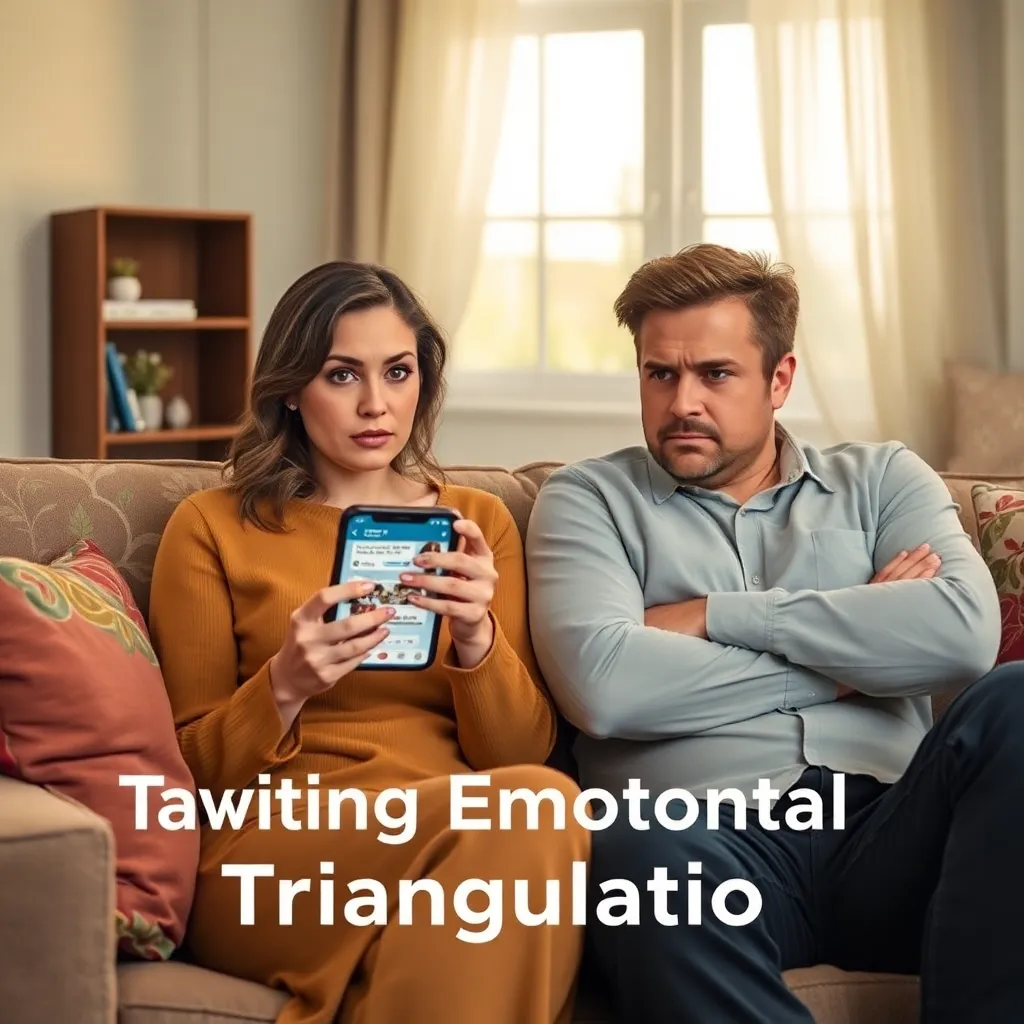Navigating the complexities of a relationship with a narcissist can often feel like walking a tightrope, with emotions running high and misunderstandings lurking at every turn. If you’ve ever found yourself caught in the web of emotional triangulation, you know firsthand the confusion and distress it can bring, especially when dealing with someone who thrives on control and admiration.
Understanding why narcissists react so negatively to emotional triangulation is crucial for those seeking clarity and peace in their relationships. This article delves into the psychological intricacies of narcissism and triangulation, offering insights into why these dynamics clash and how this knowledge can empower you to foster healthier interactions.
You’ll discover the subtle yet powerful impact of emotional triangulation on a narcissist’s psyche and how it disrupts their need for dominance. By the end of this piece, you will be equipped with practical strategies to recognize and navigate these situations, ultimately helping you regain control and emotional balance in your relationships.
1. Decoding Narcissistic Behaviors

Narcissistic behaviors can often seem perplexing, leaving partners wondering about their motivations. At the core, narcissists are driven by an overwhelming need for admiration and a lack of empathy, shaping their interactions in complex ways.
Consider a scenario where a partner constantly seeks validation through social media likes and attention. This behavior stems from a deep-seated insecurity and a relentless pursuit of external approval, which can create tension in relationships.
Experts suggest that individuals with narcissistic tendencies often struggle with vulnerability, making emotional connections challenging. Their protective facade of superiority serves as a barrier against genuine intimacy, preventing them from forming deep, meaningful bonds.
To navigate relationships with a narcissist, it’s crucial to set healthy boundaries and maintain your emotional well-being. Engage in open conversations about expectations and ensure your needs are not overshadowed by their demands.
Understanding these behaviors can empower you to approach the relationship with empathy and clarity. Recognizing the driving forces behind their actions allows for more informed, compassionate interactions, ultimately leading to healthier dynamics.
2. What Is Emotional Triangulation?

Emotional triangulation is a common dynamic in relationships where a third person is introduced into the interaction between two individuals. This can create a sense of imbalance and tension, often leading to confusion and misunderstandings.
In many cases, the third party is used as a tool to manipulate emotions and behavior. For instance, a partner might bring up an ex or a friend to invoke jealousy or insecurity in the other person, shifting power dynamics in subtle but impactful ways.
Such dynamics are not limited to romantic relationships; they can occur in familial settings or friendships as well. Imagine a scenario where a parent consistently compares siblings to one another, fostering competition rather than unity.
Experts suggest that emotional triangulation can undermine the foundation of trust, which is essential for any healthy relationship. By introducing an outsider into an intimate dynamic, it distorts communication and can erode emotional safety.
Understanding how emotional triangulation works allows you to identify it in your own relationships and take proactive steps to address it. This awareness empowers you to foster more direct and honest communication, ultimately strengthening relational bonds.
3. Narcissists’ Control and Manipulation

In relationships, a narcissist’s need for control and manipulation often takes center stage. They thrive on having power over others, orchestrating scenarios where they remain the focal point. Imagine a situation where a narcissist subtly controls who speaks to whom at a party, ensuring they always receive the most attention. This need for dominance makes them wary of emotional triangulation, as it introduces a dynamic they cannot fully dictate.
An essential part of a narcissist’s toolkit is their ability to manipulate emotions. They often employ tactics such as gaslighting to make others question their reality, thereby cementing their control. For instance, if a partner expresses discomfort with a narcissist’s behavior, the narcissist might twist the situation to make the partner feel guilty. This manipulation not only maintains their grip but also keeps their partners in a state of confusion and dependency.
When emotional triangulation occurs, it disrupts the narcissist’s carefully constructed narrative. Suddenly, there’s an outside influence that can break the cycle of their manipulation. A friend reaching out to offer support can weaken the narcissist’s hold, providing the partner with clarity and the confidence to see through the manipulation. This is why the narcissist often resents any external involvement that threatens their control.
Ultimately, understanding these dynamics is crucial for anyone in a relationship with a narcissist. Recognizing how they wield control can empower you to take back your emotional autonomy. As you become more aware of these tactics, you can begin to dismantle the hold they have over your life and relationships.
4. Why Triangulation Threatens Narcissists

Narcissists often feel their sense of superiority challenged by triangulation, as it disrupts their carefully curated image. In scenarios where a partner seeks advice from a friend, the narcissist may perceive this as a threat to their control and legitimacy.
Emotional triangulation introduces a third party that can potentially validate the victim’s feelings, which undermines the narcissist’s narrative. Imagine a situation where your partner constantly dismisses your concerns, but a trusted friend affirms them; this validation threatens the narcissist’s need for dominance.
When another perspective is introduced, it can reveal the narcissist’s manipulative tactics, making them feel exposed. This exposure not only chips away at their power but also ignites a fear of losing their partner’s admiration and allegiance.
In navigating relationships with narcissists, it’s crucial to prioritize your mental well-being. Surround yourself with supportive individuals who can offer objective perspectives and strengthen your resolve.
Ultimately, a narcissist’s aversion to emotional triangulation reveals their insecurities and reliance on control. Recognizing this can empower you to seek validation from within and from those you trust, fostering healthier interactions.
5. Navigating Relationships with Narcissists

Understanding how to navigate relationships with narcissists can be challenging but not impossible. It requires a blend of empathy, awareness, and strategic interaction to maintain your own well-being while managing their complex needs.
One common scenario is when a narcissist tries to manipulate the narrative to maintain control. Recognizing this behavior allows you to set clear boundaries and avoid becoming ensnared in their emotional games.
In some cases, a narcissist may attempt to draw you into conflict with others to assert their dominance. By staying calm and not engaging in their attempts to create drama, you can protect your emotional peace and stability.
Dr. Lisa Feldman, a renowned psychologist, suggests that maintaining a focus on your own emotional health is crucial. She advises that self-care and seeking support from trusted friends or therapists can be invaluable when dealing with narcissistic behavior.
Ultimately, navigating a relationship with a narcissist requires patience and self-awareness. By staying grounded and prioritizing your well-being, you can foster healthier interactions and ensure that your emotional needs are met.
Conclusion: Creating Beautiful Outdoor Spaces
In understanding why narcissists detest emotional triangulation, we’ve explored the dynamics of power and control, the impact of validation-seeking behaviors, the protective mechanisms narcissists employ, the role of empathy, and the importance of setting healthy boundaries. These insights illuminate the complexities of interactions with narcissists and offer a roadmap to healthier, more balanced relationships.
As an immediate next step, consider identifying any triangulation patterns in your relationships and practice setting clear boundaries to protect your emotional well-being. By doing so, you pave the way for more authentic and respectful interactions.
Don’t let these valuable insights slip away—bookmark this article to revisit these foundational concepts whenever you need guidance. This resource is a powerful tool in your journey toward nurturing healthier relationships.
Remember, understanding and applying these principles can significantly enhance your relational experiences. As you move forward, embrace the potential for improvement and empowerment in your interpersonal connections. With commitment and awareness, relationship success is within your reach. Keep these insights close, and let them inspire positive change in your life.
